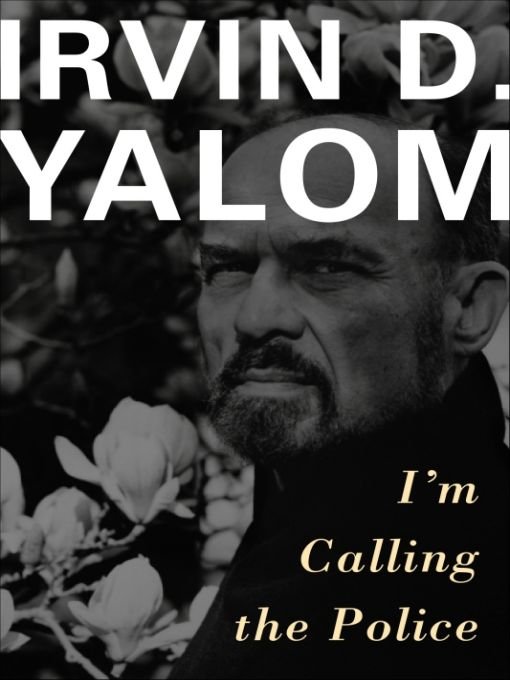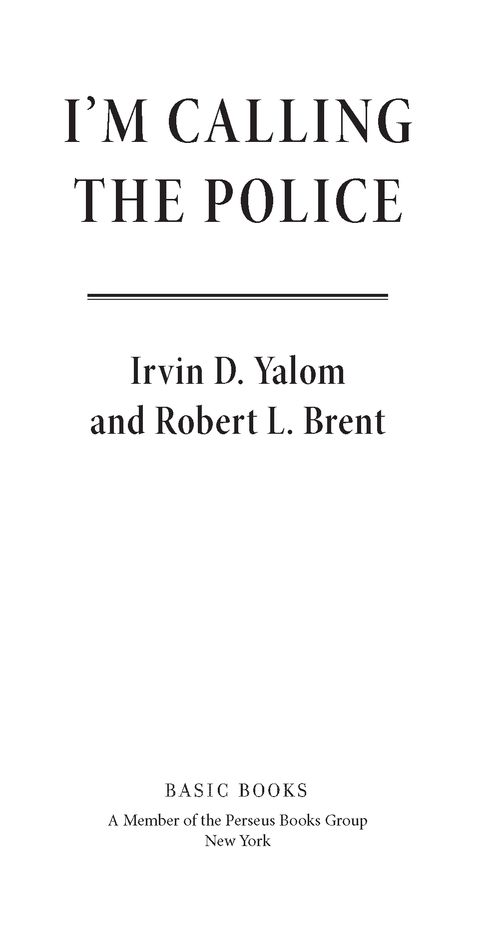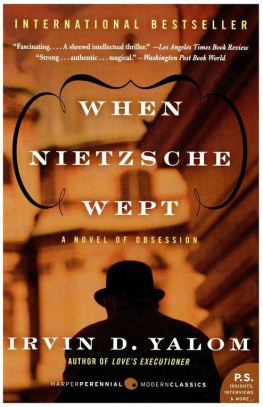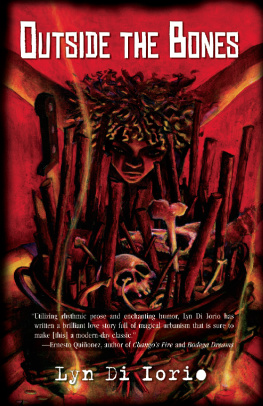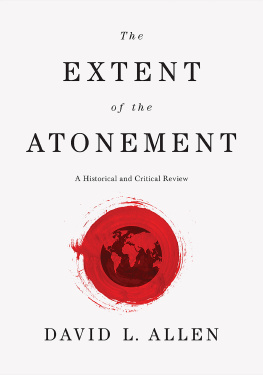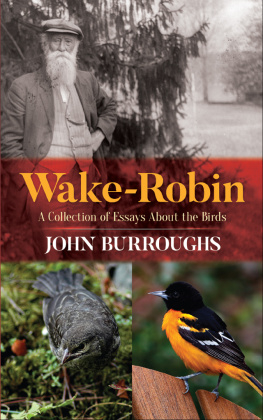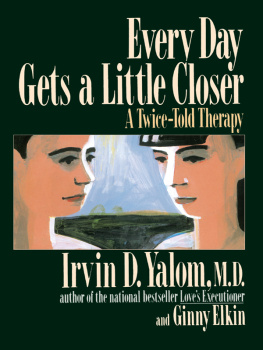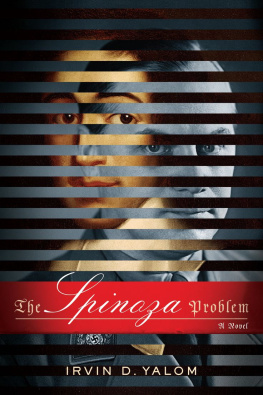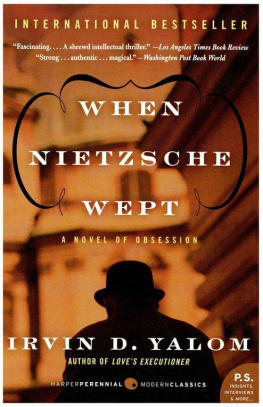Table of Contents
ALSO BY IRVIN D. YALOM
The Theory and Practice of Group Psychotherapy
(with Molyn Leszcz)
Existential Psychotherapy
Every Day Gets a Little Closer: A Twice-Told Therapy
(with Ginny Elkin)
Inpatient Group Psychotherapy
Loves Executioner
When Nietzsche Wept
Lying on the Couch
Momma and the Meaning of Life
The Gift of Therapy
The Schopenhauer Cure
Staring at the Sun
As the farewell banquet of my fiftieth medical school reunion came to a close, Bob Brent, my old friend, my only remaining friend from medical school days, gestured to me that he needed to talk. Though we had taken different professional directions, he into heart surgery and I into the talking cure for broken hearts, we had established a close bond that we both knew would be lifelong. When Bob took my arm to pull me aside, I knew something portentous was up. Bob rarely touched me. We shrinks notice things like that. He leaned to my ear and rasped, Something heavy is going on.... The past is erupting.... My two lives, night and day, are joining. I need to talk.
I understood. Ever since his childhood spent during the Holocaust in Hungary, Bob had been living two lives: a daytime life as an affable, dedicated, and indefatigable cardiac surgeon and a nighttime life when fragments of horrific memories tramped through his dreams. I knew all about his daytime life, but in our fifty years of friendship he had revealed nothing of his nocturnal life. Nor had I ever heard an explicit request for help: Bob was self-contained, mysterious, enigmatic. This was a different Bob whispering in my ear. I nodded yes, yes. I was concerned. And curious.
That we had become friends in medical school was odd. Brent was a B and Yalom a Y, and that alone should have kept us apart. Medical students commonly choose their chums from their own part of the alphabet: Cadaver dissection and lab partners and clinical rotations are assigned alphabetically, and I mostly hung around with the S to Z groupSchelling, Siderius, Werner, Wong, and Zuckerman.
Perhaps it was because of Bobs unusual appearance. From the start, his vividly blue eyes beckoned me. I had never known such a tragic, faraway gaze, a gaze that beckoned, that flirted with my gaze, but never quite met me full on. His face, no ordinary punum, was cubistic, full of sharp corners all over, sharp nose and chin, even ears. His razor-nicked skin was pallid. No sun, I thought. No carrots. No exercise.
His clothing was rumpled and nondescript gray-brown (I never once saw a bright color on him). And yet he drew me in. In times to come I was to hear women say that he was irresistibly unattractive. Irresistible is a bit strong but alluring, perhaps. Yes, I was fascinated by him: In my provincial Washington, DC, high school and college I had never met anyone remotely like Bob.
Our first encounter? I remember it well. I was studying in the medical school library where he spent evenings doing bibliographic research for Professor Robbinss textbook of pathology (a text destined for a bright future, a text that educated, and still does, generations of physicians all over the world). One evening at the library he strolled over and informed me that I had studied enough for the nephrology exam the next day.
Do you want to earn some money? he asked. Robbins has given me far too much work, and I need some help.
I jumped at the offer. Aside from some pocket money gained by selling my blood and spermthe traditional medical student source of fast cashI was totally supported by the proceeds of my parents grocery store.
Why me? I asked.
Ive been watching you.
And?
And you might have potential.
Soon we were spending three or four evenings a week side by side in the Boston University Medical Library working for Dr. Robbins or in my apartment schmoozing or studying. It was mainly me studyingBob didnt seem to need to. And besides he was preoccupied with solitaire, which he played hour after hour, sometimes, he claimed, for the New England championship, sometimes the world championship.
Before long, I learned that he was a war refugee who had survived the Holocaust and found his way alone as a DP (displaced person) at the age of seventeen to Boston.
I thought of myself at seventeensurrounded by friends, embraced by family, preoccupied with wide neckties, my clumsy dancing, and fraternity politics. I felt nave, soft, flabby. How did you do it, Bob. Who helped? Did you speak English?
Not a word. With the equivalent of an eighth grade education I started Boston Latin High School and a year later was a freshman at Harvard, then on to medical school.
How? Im sure that if I had applied, I couldnt have gotten into Harvard. And where did you live? And with whom? Sponsors? Relatives?
So many questions. I did it by myselfthats the answer.
At our graduation ceremony I remember my mother and father and my wife with our baby encircling me and, there, far off on one side, I spotted Bob standing alone, rocking gently on his heels, clutching his diploma. After graduation he took a medical internship, and then a general surgical residency, followed by a thoracic and cardiac surgical residency. The day after finishing his training he was offered the post of chief of cardiac surgery at a Boston teaching hospital, and five years later he was professor of surgery and chairman of cardiothoracic surgery at Boston University. He published furiously; he taught and operated indefatigably. He was the first in the world to implant a partial artificial heart with long-term survival. And all of this utterly alone in the worldhe had lost everyone in the Holocaust.
But he would say nothing of his past. I was burning with curiosity, having never met anyone who had experienced firsthand the horror of the camps, but he brushed away my questions by chiding me for voyeurism.
Maybe, he teased, if you behave, Ill tell you more.
I did behave, yet years passed before he was willing to answer questions about the war. When we entered our sixties, I noted a change. First, he seemed more open and willing to talk. And then, as the years marched by, he grew almost eager to speak to me of past horrors.
But was I ready to listen? Had I ever been ready to listen? It was only after I began my training in psychiatry and entered my own analysis and mastered some of the subtleties of interpersonal communication that I grasped something essential about my relationship with Bob: It wasnt only that Bob was silent about his past; it was also that I did not want to know. He and I had colluded together in his long silence.
I remember as a teenager being transfixed, horrified, sickened by the postwar newsreels documenting the liberation of the camps. I wanted to look. I felt I should look. These were my peopleI had to look. But whenever I did, I was shaken to the core, and even to this day I am unable to block the intrusion of those raw images: the barbed wire, the smoking ovens, the few surviving skeletal figures in striped rags. I was lucky: I could have been one of those skeletons had my parents not emigrated before the Nazis came to power. And, worst of all, were the images of bulldozers moving vast mountains of bodies. Some of those bodies belonged to my family: My fathers sister was murdered in Poland, as were my Uncle Abes wife and three children. He came to the United States in 1937, intending to bring over his family but ran out of time.

